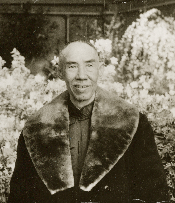Mind Boxing is a loose translation of the Chinese internal martial art known as Yìquán (literally: “intent to grasp something scattered”). It’s called an internal martial art because it comes from the nèijiā tradition which includes the styles that focus on internal strength aspects (nèijìng) such as mental and spiritual qualities and the use of qi (breath, spirit), rather than the external aspects of muscular strength and physical interaction (wài). The modern practices of Tàijíquán (t’ai chi), Qìgōng, Reiki and Aikido all derive from this internal strength tradition and their popularity around the world attests to its high status in both martial arts and healing practices.
Yìquán‘s principle proponent was a Wudang-style Xíng Yì Quán (literally: “form-will boxing”) Master, Wáng Xiāngzhāi, who also popularised a postural practice called Zhan Zhuang (literally: “pole standing”) which has the main purpose of strengthening postural muscles that are not normally under our conscious control but can be influenced by exercises designed for that purpose and are undertaken with intent (the Yì character’s literal meaning). What distinguishes Yìquán from other martial arts is the fact that Master Wáng believed that it should be learned as a mental form without direct reference to other antecedent styles – hence the translation of Yìquán as “mind boxing”.
I find this concept quite intriguing. Most martial arts follow a fairly predictable pattern where students are expected to recreate patterns of movement without question to the point where muscle memory kicks in and movement happens as almost a reflexive response to a given context. Yìquán seems to reverse this idea, asking the student to shape movements that derive from postural forms (Zhan Zhuang) and breathing patterns into active movements. Master Wáng expressed his own doubts that others were able to master his approach, saying that they failed to get the point of the lessons that Yìquán practices try to teach.
